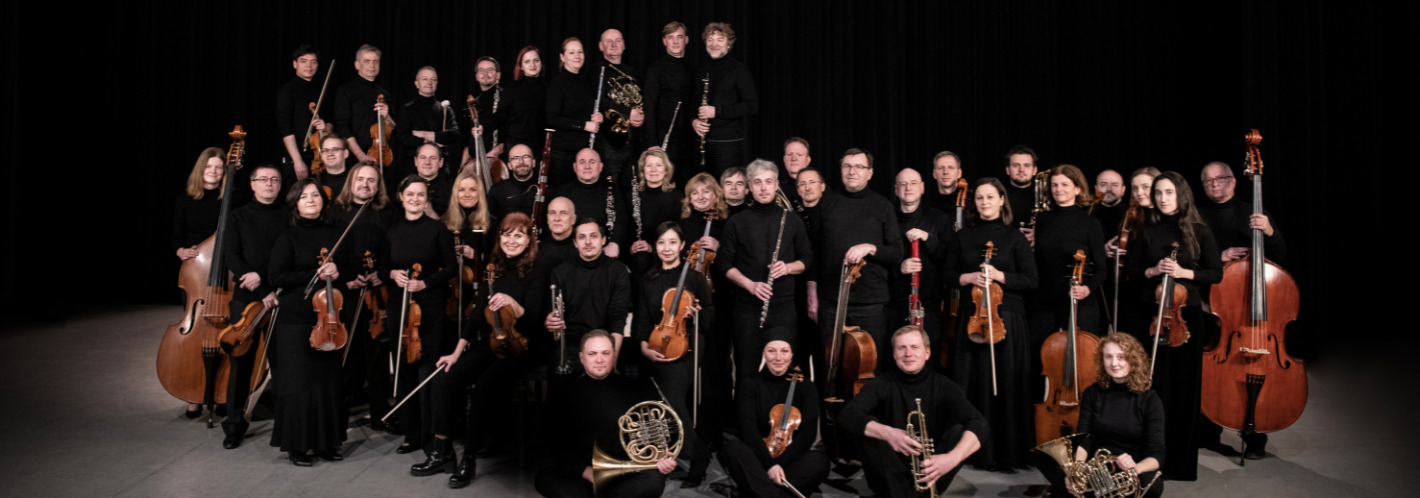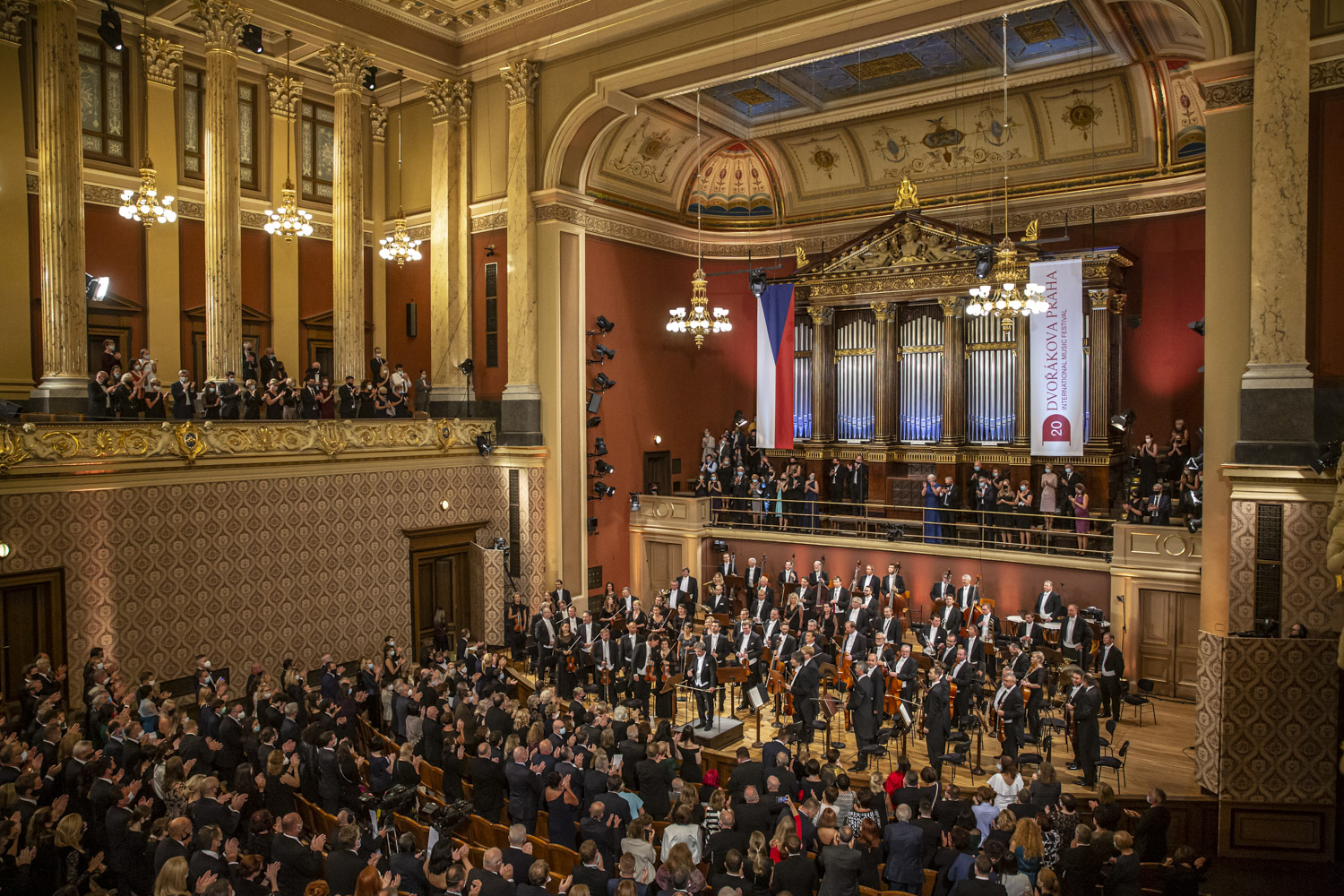
Ferenc Liszt: Les Preludes, Symphonic Poem, S. 97
Elias Parish Alvars: Concerto for Harp and Orchestra in E flat Major Op. 98
Samuel Barber: Adagio for Strings
Leoš Janáček: Taras Bulba, Rhapsody for orchestra
In music, virtuosity is an admired, although its value is sometimes overestimated. Franz Liszt, Elias Parish Alvars, and Leoš Janáček were all virtuosos in their own entirely different ways, but at the same time the quality of their musicianship could hardly be overstated. All three were somehow unique and incomparable. The special characteristics of their composing, playing, and thinking will represent a challenge for this partnership of experienced and youthful musicians who constitute the orchestra Prague Philharmonia in conjunction with its Orchestral Academy. The concert opens with Les préludes, the third of the thirteen symphonic poems composed by Franz Liszt. One of the most influential musicians of the nineteenth century is presented here as the creator of the musical genre of the symphonic poem and of programme music, and also as an exceptional composer of orchestral music. It is good from time to time to be reminded of how his music influenced Bedřich Smetana and of how much Richard Wagner borrowed from him. In his day, the harpist Elias P. Alvars was famed primarily as an outstanding player, and he came to be called the “Liszt of the Harp”. This was because of not only his exceptional ability as a player, but also his personal charisma. In addition, he and Liszt both played superb instruments made by the company Érard. Performing Alvars’s Harp Concerto in E Flat Major will be Jana Boušková, the principal harpist of the Czech Philharmonic and an outstanding soloist. The rhapsody Taras Bulba is one of the masterpieces by Dvořák’s friend and admirer Leoš Janáček. Janáček’s work is explicitly programmatic, and it employs expressive resources to the extreme. It is in part thanks to this that the music moves listeners with almost cinematic eloquence. The patriotic tale of the Cossack chief Taras Bulba is framed by the deaths of his sons and finally by his own death. It is the title hero’s intractability that ultimately brings the composition to its emotional conclusion and reminds us of the perseverance of the human spirit.
In 1994, the world-renowned conductor Jiří Bělohlávek, together with a group of talented young musicians, founded the Prague Chamber Philharmonic Orchestra. Its successes abroad and expanding repertoire led the orchestra to first change its name to PKF–Prague Philharmonia, and now, in the 2024/2025 season, it presents itself as the Prague Philharmonia.
Over the past 30 years, the orchestra has earned recognition across the musical world for its distinctive sound and its focused repertoire, which centres on the works of Joseph Haydn, W. A. Mozart, and Ludwig van Beethoven. Its core repertoire also includes music by Antonín Dvořák, Bedřich Smetana, and their successors, as well as French and German composers ranging from Robert Schumann to Johannes Brahms and Maurice Ravel. Twentieth-century compositions and contemporary works are also an integral part of its programming. The Prague Philharmonia retains its chamber character, as well as its passionate commitment and attention to detail, yet today it stands between a chamber ensemble and a small symphony orchestra in terms of size.
Since its founding, the orchestra has been led by a number of renowned chief conductors, each of whom has contributed in his own way to the development of the Prague Philharmonia’s distinctive sound. Following Jiří Bělohlávek, Kaspar Zehnder took over as chief conductor in 2005, followed by Jakub Hrůša in 2008. Since the beginning of the 2015/2016 season, the orchestra has been under the leadership of French conductor Emmanuel Villaume.
The Prague Philharmonia has performed with internationally acclaimed soloists, including Julian Rachlin, Martha Argerich, Yefim Bronfman, András Schiff, Gil Shaham, Isabelle Faust, Emmanuel Pahud, Luciano Pavarotti, Diana Damrau, Anna Netrebko, Plácido Domingo, Gautier Capuçon, Maxim Vengerov, Mischa Maisky, Juan Diego Flórez, Jonas Kaufmann, and many others.
The orchestra is regularly invited to prestigious international music festivals, such as the BBC Proms, Dresdner Musikfestspiele, MITO Settembre Musica, Prague Spring, and Festspielhaus Baden-Baden. It has performed at renowned concert venues, including the Berliner Philharmonie, Elbphilharmonie Hamburg, Gasteig Munich, Tokyo Suntory Hall, Royal Opera House Muscat in Oman, Sheikh Jaber Al-Ahmad Cultural Centre in Kuwait, Seoul Arts Center, Musikverein Vienna, and Théâtre des Champs-Élysées in Paris, among others.
The Prague Philharmonia's discography includes more than 90 recordings for prestigious international and Czech music labels, such as Deutsche Grammophon, Warner Classics, Sony Classical, Decca, EMI, Harmonia Mundi, and Supraphon. Its recordings have garnered numerous awards, including the Gold Record RAC Canada in 2000, the Harmonie Award in 2001, and the Diapason d’Or in 2007. The album Héroïque with Bryan Hymel was nominated for the International Opera Award in 2016, while Bohemian Rhapsody with Gábor Boldoczki received a nomination for the International Classical Music Award (ICMA) in 2017. Its Ravel, Debussy & Bizet recording received outstanding reviews from The Sunday Times, Gramophone, and BBC Music Magazine, which included it in its top 10 recordings of the week. The orchestra's collaboration with acclaimed tenor Benjamin Bernheim for Deutsche Grammophon in November 2019 won the Opus Klassik Award and received multiple accolades in the international press, including the Diapason d’Or and Choc de Classica.
Most recently, the orchestra has toured Japan, Germany, Italy, Turkey, France, and Taiwan, and has performed at the Musikverein in Vienna. In 2023, it recorded an album for Deutsche Grammophon with tenor Jonathan Tetelman and a recording of works by Penderecki with flutist Stathis Karapanos for Warner Classics.
source: Prague Philharmonia

The Orchestral Academy of the Prague Philharmonia was established in 2008 as the very first project of its kind in the Czech Republic. It is intended for young Czech and foreign performers between eighteen and thirty years of age, and it enables them to gain orchestral experience and to draw on the experience of the members of a renowned ensemble. Annually, the academy accepts between twelve and fourteen musicians who play violin, viola, cello, bass, flute, oboe, clarinet, French horn, trumpet, trombone, and percussion. Right at the beginning of their musical careers, members of the Orchestral Academy get a unique opportunity to participate in the artistic projects of the Prague Philharmonia, to give concerts on stages in this country and abroad, to appear in the concert series of the orchestra, and to take part in recording projects for renowned labels. The Orchestral Academy of the Prague Philharmonia has been in existence for more than ten years, and in that time, among the outstanding players to go through the fellowship programme have been the violinist Jakub Fišer, the violist Ondřej Martinovský, and the French horn player Kateřina Javůrková.
The conductor Marek Šedivý is a graduate of conducting studies at the Prague Conservatoire and the Academy of Performing Arts in Prague. During the 2012/13 season, he was engaged at the recommendation of Jiří Bělohlávek as the assistant conductor for a production of Wagner’s opera Tristan und Isolde at the Canadian Opera Company in Toronto. From 2016 to 2018 he was the chief conductor at the Silesian Theatre in Opava, and he has also worked at the State Opera in Prague, the J. K. Tyl Theatre in Pilsen, and the National Moravian – Silesian Opera in Ostrava. Among the operas he has conducted at those theatres have been Cavalleria Rusticana (Mascagni), Rusalka (Dvořák), Falstaff (Verdi), The Cunning Little Vixen (Janáček), and The Tempest (Fibich). He is currently the principal guest conductor of the Prague Radio Symphony Orchestra, and he is the music director designate of the National Moravian – Silesian Opera in Ostrava from the 2020/2021 season. He appears at such prestigious music festivals as Prague Spring, the Chopin Festival in Mariánské Lázně, the Dvořák Prague Festival, Pardubice Musical Spring, and Mozartfest Würzburg. In September 2019 he made his debut in Vienna with the Tonküstler Orchestra, where he performed Dvořák’s Requiem.
The harpist Jana Boušková is an international phenomenon. Besides taking first prize at the world’s most prestigious harp competition (USA, 1992), her other numerous awards include victory at the Concours International de Musique de Chambre in Paris and at the Torneo Internazionale di Musica in Italy. She appears regularly as a soloist and in chamber music ensembles at important Czech and foreign concert stages and festivals. Among her most important appearances have been solo recitals at New York’s Alice Tully Hall in the Lincoln Center, the Théâtre du Châtelet in Paris, the Musikverein in Vienna, the Prague Spring Festival, and the Berliner Festtage. As a soloist with orchestra she has appeared at New York’s Carnegie Hall, Tokyo’s Suntory Hall, the Gewandhaus in Leipzig, and the Concertgebouw in Amsterdam. Since September 2019 she has been a professor at the prestigious Royal College of Music in London, and since 2005 she has also been teaching at the Royal Conservatoire in Brussels. She has made more than twenty CDs for Czech and foreign labels. Since 2005 she has been the principal harpist of the Czech Philharmonic.
The Rudolfinum is one of the most important Neo-Renaissance edifices in the Czech Republic. In its conception as a multi-purpose cultural centre it was quite unique in Europe at the time of its construction. Based on a joint design by two outstanding Czech architects, Josef Zítek and Josef Schultz, a magnificent building was erected serving for concerts, as a gallery, and as a museum. The grand opening on 7 February 1885 was attended by Crown Prince Rudolph of Austria, in whose honour the structure was named. In 1896 the very first concert of the Czech Philharmonic Orchestra took place in the Rudolfinum's main concert hall, under the baton of the composer Antonín Dvořák whose name was later bestowed on the hall.
